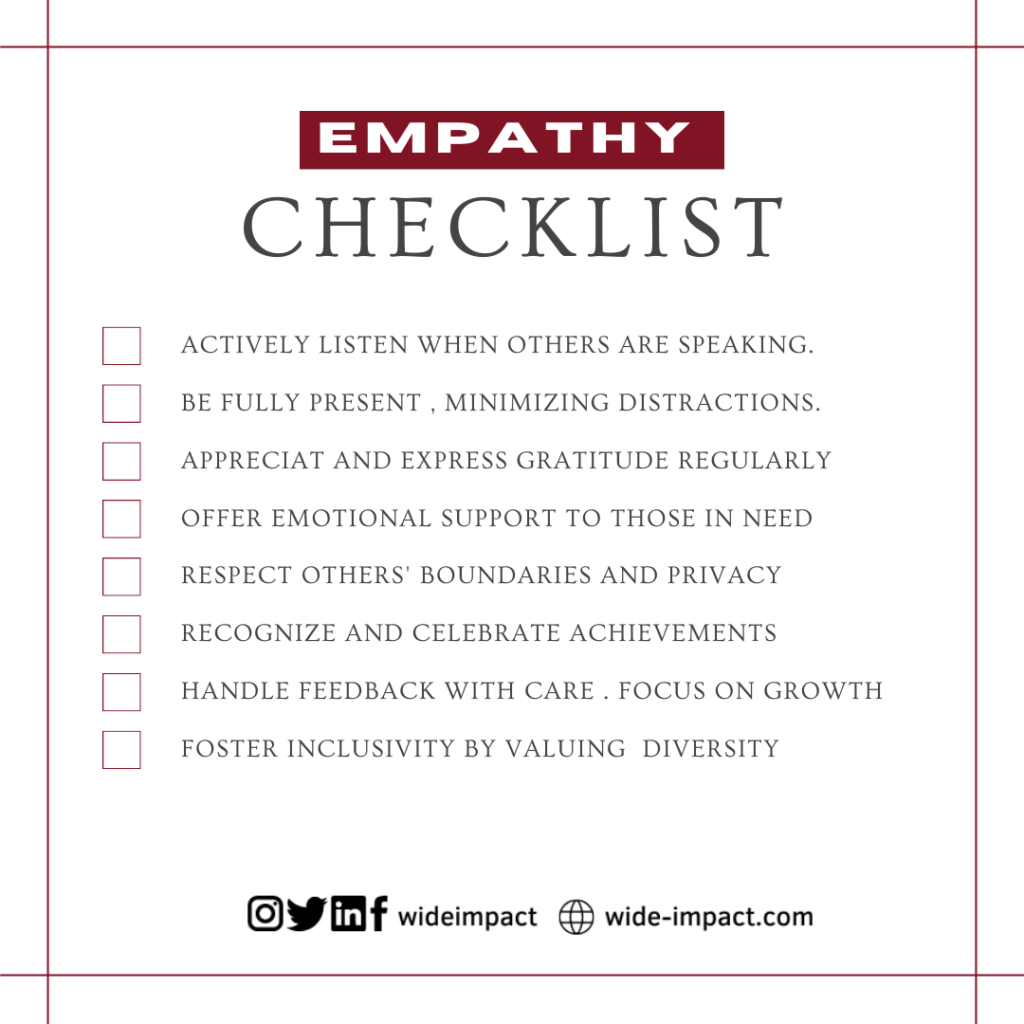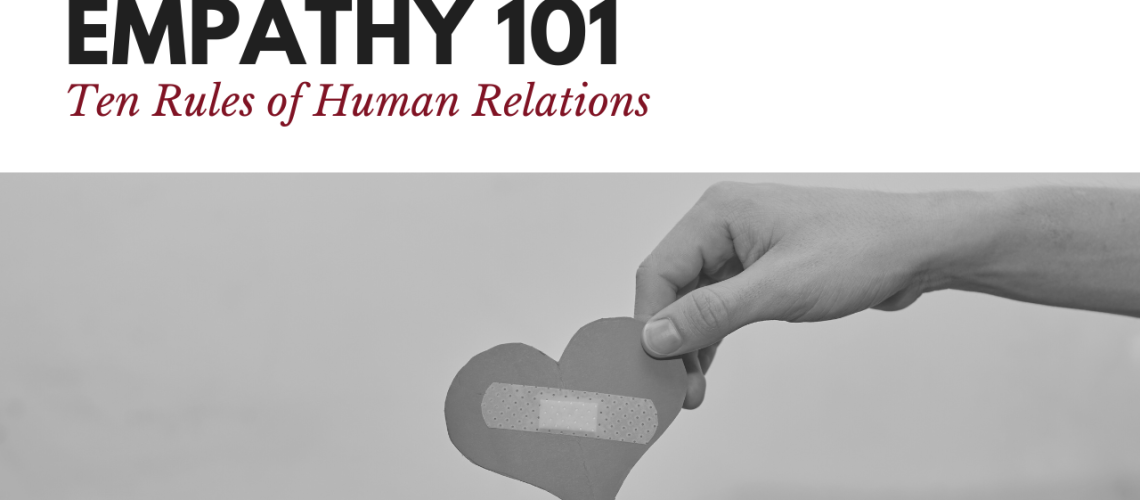By Dr. Salam Slim Saad
In a world filled with constant hustle and bustle, it’s easy to forget the importance of empathy in our daily interactions. Empathy is the secret ingredient that can transform relationships from ordinary to extraordinary, it’s the ability to understand and share the feelings of others. It involves stepping into someone else’s shoes and truly connecting with their emotions. Whether it’s a conversation with your partner, a discussion with your colleagues, or even an encounter with a stranger on the street – practicing empathy can make all the difference.
Empathy is a powerful tool—it’s what allows us to understand other people, judge situations fairly and make decisions that are best for everyone involved. Without empathy, it’s hard to maintain a healthy relationship or be an effective leader.
But there’s more to empathy than just being aware of other people’s feelings. In this article, we’re going to explore ten rules you can follow to become a better empathizer.
Rule 1: Listen More Than You Speak.
In any conversation, be it with a friend, family member, or coworker, the art of listening is often underestimated. We’re so eager to get our point across or share our own experiences that we forget the power of simply hearing someone out.
When you listen more than you speak, you create an environment where others feel valued and understood. It shows that their thoughts and feelings matter to you. And let’s face it – who doesn’t want to feel heard?

So how can we practice this rule in our daily interactions?
- Resist the urge to interrupt or interject your own opinions. Give the other person your full attention and let them express themselves fully.
- Ask open-ended questions that encourage further discussion rather than just waiting for your turn to talk. This not only demonstrates interest but also helps deepen your understanding of their perspective.
- Try not to offer unsolicited advice unless specifically asked for it. Sometimes people just need someone they can vent to without judgment or solutions being thrown at them.
By prioritizing listening over speaking, we cultivate stronger connections with those around us and foster a sense of trust and empathy in our relationships. So remember: take a step back and truly listen – you might be surprised by what you learn!

Rule 2: Put Yourself In The Other Person’s Shoes
Empathy is all about understanding and connecting with others on a deeper level. It’s about stepping outside of our own perspective and immersing ourselves in someone else’s world. One powerful way to achieve this is by putting yourself in the other person’s shoes.
When we genuinely attempt to see things from their point of view, it opens up a whole new level of understanding and compassion. We start to realize that everyone has their own unique experiences, beliefs, and struggles that shape how they perceive the world
Putting yourself in someone else’s shoes doesn’t mean you have to agree with them or even condone their actions. It simply means acknowledging their feelings and trying to understand where they’re coming from.
By doing this, we can build stronger relationships based on empathy and mutual respect, bridging gaps between different perspectives and finding common ground for connection.
So, the next time you find yourself in a disagreement or misunderstanding with someone, take a moment to pause and reflect. Try your best to see things through their eyes before jumping to conclusions or making assumptions.
Remember, empathy is not just an act of kindness but also an essential skill for fostering healthy human relationships. Striving to put ourselves in other people’s shoes every day may just be the key that unlocks greater understanding and harmony in our lives!

Rule 3: Be Patient And Understanding
When we approach interactions with patience and understanding, we create an atmosphere that fosters trust and openness.
Patience is a virtue that requires discipline and self-control. It means giving others the time they need to express themselves, without interrupting or rushing them. By practicing patience, we show respect for the other person’s thoughts and feelings.
Understanding goes hand in hand with patience, as it entails viewing things from another person’s perspective. When we make a conscious effort to grasp where someone is coming from, it empowers us to respond with greater compassion.”
Being patient also means being willing to listen without judgment or assumptions. We must resist the urge to jump to conclusions or impose our own opinions onto others’ experiences. Instead, let’s strive for open-mindedness and curiosity.
Furthermore, being patient doesn’t mean enabling negative behavior or accepting mistreatment. It means setting boundaries while still showing empathy towards others’ struggles or challenges.Remember that everyone has their own unique circumstances and life experiences that shape who they are today. By remaining patient and understanding in our interactions, we can forge stronger connections based on mutual respect and compassion

Rule 4: Don’t Judge Or Assume
We all have our own unique experiences and perspectives, so it’s crucial to remember that we can never fully understand someone else’s situation without truly listening and empathizing.
When we judge or assume, we are putting ourselves in a position of superiority, believing that our way of thinking or behaving is the only correct one. This not only closes off the possibility of learning from others but also creates barriers in our relationships.
Instead, it is far more effective to approach each interaction with an open mind and a willingness to learn. By suspending judgment and assumptions, we create space for understanding and growth. We give others the opportunity to express themselves freely without fear of being misunderstood or labeled.
Rule 5: Show Genuine Interest and Concern
It’s not enough to simply go through the motions or pretend to care – people can see right through that. Instead, take the time to truly understand what makes the other person tick. Show empathy by acknowledging their emotions without judgment or criticism. This will make them feel heard and valued.
Remember, it’s not just about listening – it’s about actively engaging in conversation with a sincere desire to understand. Take note of details they mention so you can refer back to them later. By doing so, you demonstrate that you genuinely care about what they have to say.

Don’t be afraid to offer words of encouragement or support when needed. Let them know that you’re there for them if they need someone to lean on or talk things through with.
Showing genuine interest involves being present in the moment – both mentally and emotionally. Put away distractions like your phone or computer during conversations so you can give your full attention.

Rule 6: Validate The Other Person’s Feelings
When you validate someone’s feelings, you let them know that their emotions are valid and important. This simple act can have a profound impact on your relationship with others.
Validation begins with active listening. Take the time to truly hear what the other person is saying, without interrupting or dismissing their concerns. Show genuine interest in their perspective and ask open-ended questions to encourage further dialogue.
It’s essential to avoid minimizing or belittling someone’s emotions. Instead, acknowledge how they feel by using phrases like “I understand why you might be feeling this way” or “That sounds really tough.” By doing so, you show empathy and create a safe space for them to express themselves fully.
Remember that validation doesn’t mean agreeing with everything the other person says or feels. It means recognizing their right to experience those emotions without judgment. Respecting their viewpoint fosters trust and strengthens your connection.
Validating someone’s feelings also involves nonverbal cues such as maintaining eye contact, nodding affirmatively, and mirroring body language when appropriate. These actions demonstrate that you are engaged in the conversation and genuinely care about what they’re sharing.
Rule 7: Communicate With Kindness And Respect
Effective communication is the key to building strong and healthy relationships. When we communicate with kindness, we create a safe space for open dialogue, fostering understanding and connection.
Kindness begins with choosing our words carefully. It means speaking in a gentle tone, avoiding harsh or judgmental language that can cause harm or alienation. By using respectful language, we show that we value the other person’s thoughts and feelings.

Active listening is another crucial aspect of communicating with kindness and respect. It involves giving our full attention to the speaker without interrupting or formulating responses before they have finished speaking. Through active listening, we demonstrate genuine interest in what the other person has to say.
Furthermore, non-verbal cues play an essential role in effective communication. Maintaining eye contact, nodding affirmatively, and displaying open body language convey attentiveness and respect towards the speaker.
In addition to being kind in our words and actions during conversations, it’s also important to be mindful of cultural differences when communicating across diverse backgrounds. Being aware of cultural nuances helps us avoid unintentionally offending someone or causing misunderstandings due to different norms or customs.

Rule 8: Show Appreciation
It is a way to express gratitude and acknowledge the value of someone’s efforts or presence in our lives. Whether it’s a simple thank you note, a heartfelt compliment, or a small gesture of kindness, showing appreciation can leave a lasting impact.
When we show genuine appreciation towards others, we validate their contributions and make them feel seen and valued. It creates an atmosphere of positivity and fosters stronger connections between individuals. Taking the time to notice and acknowledge the good that someone brings into our lives can boost their self-esteem and motivate them to continue doing great things.
Appreciation doesn’t have to be grandiose; even the smallest acts can make a big difference. A sincere smile, words of encouragement, or simply saying “thank you” can brighten someone’s day. By expressing our gratitude openly and authentically, we create an environment where people feel appreciated for who they are and what they do.
Rule 9: Offer Support
When someone is going through a difficult time or facing challenges, it’s vital that we extend a helping hand.
Support can take many forms. It could be lending an ear for them to vent their frustrations or providing practical assistance when needed. Sometimes, all it takes is a simple gesture of kindness and understanding.

By offering support, we show others that they are not alone in their struggles. We validate their feelings and let them know that we care about their well-being. This can make a world of difference in someone’s life.
It’s crucial to remember that support should be given without judgment or expectations. The focus should be on the other person and what they need from us, rather than trying to fix everything for them.

Rule 10: Recognize Achievements
When we acknowledge and appreciate the accomplishments of others, it not only boosts their self-esteem but also strengthens our bond with them. Whether it’s a small milestone or a significant accomplishment, taking the time to recognize someone’s achievements can have a profound impact.The key to effectively recognizing achievements lies in being genuine and specific in your praise. Instead of simply saying “good job,” try highlighting the specific actions or qualities that led to their success. By doing so, you show that you truly paid attention and understood their efforts
Furthermore, celebrating achievements should extend beyond words. Consider taking tangible actions such as giving a thoughtful gift or organizing an event in honor of their accomplishment. These gestures go a long way in showing your support and making the person feel valued.
In addition to individual recognition, creating opportunities for group celebrations is equally important. When everyone comes together to celebrate each other’s successes, it fosters camaraderie and creates an uplifting atmosphere within the community.
In a world where we often rush through life, empathy stands as a powerful tool for creating deeper connections and understanding in our interactions. It’s the ability to walk in someone else’s shoes and truly grasp their emotions. Empathy isn’t just a kindness; it’s a vital skill for building healthy relationships.
Listening more than we speak, putting ourselves in others’ shoes, and practicing patience and understanding are essential rules for becoming better empathizers. Avoiding judgment and assumptions, showing genuine interest, validating feelings, communicating with kindness and respect, expressing appreciation, offering support, and recognizing achievements are equally crucial.
In the words of Helen Keller, “The best and most beautiful things in the world cannot be seen or even touched – they must be felt with the heart.” Through empathy, we can touch the hearts of others, fostering a world of deeper connections and understanding.
In the words of the wise, “Empathy is the language of the heart, spoken by all.”
May we continue to speak this language fluently, building a world where empathy binds us all together.
In a world where we often rush through life, empathy stands as a powerful tool for creating deeper connections and understanding in our interactions. It’s the ability to walk in someone else’s shoes and truly grasp their emotions. Empathy isn’t just a kindness; it’s a vital skill for building healthy relationships.

Listening more than we speak, putting ourselves in others’ shoes, and practicing patience and understanding are essential rules for becoming better empathizers. Avoiding judgment and assumptions, showing genuine interest, validating feelings, communicating with kindness and respect, expressing appreciation, offering support, and recognizing achievements are equally crucial.
In the words of Helen Keller, “The best and most beautiful things in the world cannot be seen or even touched – they must be felt with the heart.” Through empathy, we can touch the hearts of others, fostering a world of deeper connections and understanding.
In the words of the wise, “Empathy is the language of the heart, spoken by all.”
May we continue to speak this language fluently, building a world where empathy binds us all together.



